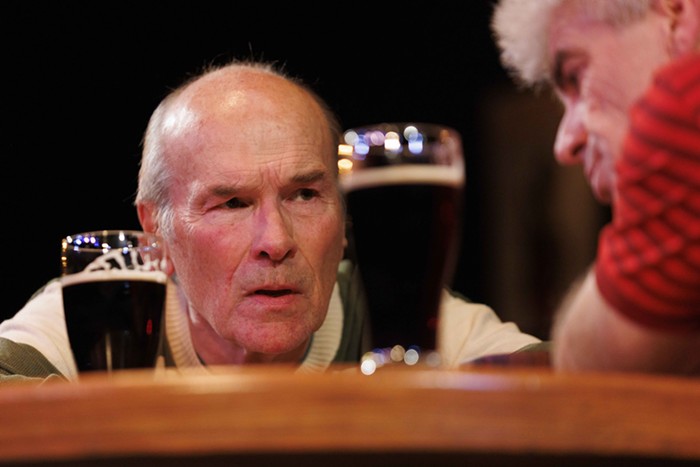It's a simple, universally accepted maxim: Whenever possible, clowns should be brutally beaten. Some props, then, must go to The Centering—a one-man show about Davey, a repeatedly beaten prisoner who (the press release says it best) "escapes to the only refuge available: the circus clown within his mind."
That's about it: Davey, who's being held by an unseen enemy for unclear purposes, is brutalized regularly; knowing his death is encroaching, he withdraws into what's either a delusion or a flashback... by pretending to be a circus clown. The play's repetitive formula: One minute, Davey's cowering on the floor, begging for pity from his silent captors and screaming "Oh, GOD!" over and over; the next, he's jumping about in a red rubber nose, talking in a goofy accent, and juggling scarves as he chats up audience members.
Chris Harder, who plays Davey, is certainly impressive— shifting roles and dispositions with ease, his characters' nuances and quirks make each instantly identifiable. Harder's confident physicality is also a boon: In his clowning bits, he gets in some clever gags, and he throws himself with equal vigor into the more violent scenes—the guy can writhe like nobody's business.
But while Harder and Steve Patterson's script is built upon the contrasting of slapstick comedy and maudlin melodrama, the playwrights seem oblivious to how each of those halves utterly diffuses the other: Every time Davey's whimpering on the floor, there's no emotional impact, since the audience is just waiting for him to jump up, slap on his clown nose, shout "Presto!" and start joking around. (By the way, he really does shout "Presto!" He shouts it a lot.) And even as Harder pulls audience members onstage to participate in comedy routines, one can practically count down the seconds until Davey will be getting electrocuted and/or kicked in the balls by his torturers. Throughout all this cartoonish, tiresome, and manipulative flip-flopping, there are allusions to something better—but the play's too-few hints of meaningful plot and interesting backstories are, frustratingly, never fleshed out.
More than anything, though, the dichotomy of The Centering is simply tedious: happy, sad, happy, sad, happy, sad, happy, and—yep, you guessed it!—sad. With such simplistic and unchallenging halves, the whole play's a bust—it's impossible to give the dramatic parts of The Centering any weight, just as it's equally futile to try and enjoy the comedy bits. But if nothing else, at least one's never more than a few minutes away from some pretty impressive writhing. The writhing of a clown, no less.



















